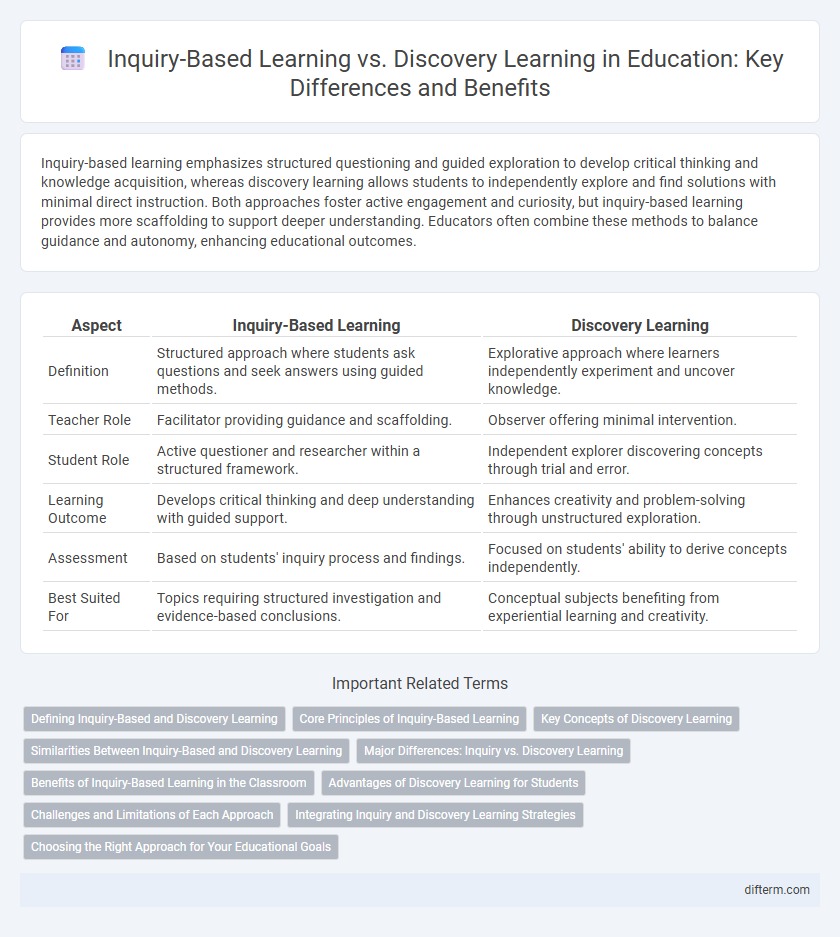Inquiry-based learning emphasizes structured questioning and guided exploration to develop critical thinking and knowledge acquisition, whereas discovery learning allows students to independently explore and find solutions with minimal direct instruction. Both approaches foster active engagement and curiosity, but inquiry-based learning provides more scaffolding to support deeper understanding. Educators often combine these methods to balance guidance and autonomy, enhancing educational outcomes.
Table of Comparison
| Aspect | Inquiry-Based Learning | Discovery Learning |
|---|---|---|
| Definition | Structured approach where students ask questions and seek answers using guided methods. | Explorative approach where learners independently experiment and uncover knowledge. |
| Teacher Role | Facilitator providing guidance and scaffolding. | Observer offering minimal intervention. |
| Student Role | Active questioner and researcher within a structured framework. | Independent explorer discovering concepts through trial and error. |
| Learning Outcome | Develops critical thinking and deep understanding with guided support. | Enhances creativity and problem-solving through unstructured exploration. |
| Assessment | Based on students' inquiry process and findings. | Focused on students' ability to derive concepts independently. |
| Best Suited For | Topics requiring structured investigation and evidence-based conclusions. | Conceptual subjects benefiting from experiential learning and creativity. |
Defining Inquiry-Based and Discovery Learning
Inquiry-based learning emphasizes student-driven questioning, investigation, and critical thinking to develop understanding, where learners actively construct knowledge through guided exploration. Discovery learning promotes experiential engagement by allowing students to independently explore concepts, leading to knowledge acquisition through self-directed discovery without explicit instruction. Both approaches foster active learning but differ in the level of teacher guidance, with inquiry-based learning providing more structured support compared to the open-ended nature of discovery learning.
Core Principles of Inquiry-Based Learning
Inquiry-based learning centers on student-driven questioning, promoting deeper understanding by encouraging learners to explore and investigate topics actively. Core principles include fostering curiosity, critical thinking, and the iterative process of formulating hypotheses, gathering evidence, and reflecting on findings. This approach contrasts with discovery learning by emphasizing guided exploration supported by scaffolding and teacher facilitation to enhance cognitive development.
Key Concepts of Discovery Learning
Discovery learning centers on student-driven exploration where learners actively engage with materials and problems to construct knowledge independently. Key concepts include problem-solving, hypothesis generation, and iterative experimentation, enabling deeper understanding through personal experience. This approach contrasts with inquiry-based learning by emphasizing self-guided discovery rather than structured questioning frameworks.
Similarities Between Inquiry-Based and Discovery Learning
Inquiry-based learning and discovery learning both emphasize student-centered exploration and active engagement with content, fostering critical thinking and problem-solving skills. Both approaches encourage learners to construct knowledge through questioning, investigation, and hands-on experiences in authentic contexts. These methods promote deeper understanding by allowing students to derive concepts independently rather than passively receiving information.
Major Differences: Inquiry vs. Discovery Learning
Inquiry-based learning emphasizes structured questioning and guided exploration to develop critical thinking skills, while discovery learning relies on students independently uncovering knowledge through experimentation. Inquiry learning involves teacher support to scaffold the learning process, whereas discovery learning encourages autonomous problem-solving with minimal intervention. The key distinction lies in the level of guidance provided, with inquiry-based learning fostering deeper understanding through inquiry cycles, compared to discovery learning's open-ended exploration.
Benefits of Inquiry-Based Learning in the Classroom
Inquiry-based learning fosters critical thinking by encouraging students to ask questions and explore concepts deeply, leading to enhanced comprehension and retention. This approach promotes active engagement and collaboration, helping learners develop problem-solving skills and intellectual curiosity. It creates a student-centered environment where learners take ownership of their education, resulting in higher motivation and academic achievement.
Advantages of Discovery Learning for Students
Discovery learning enhances critical thinking by encouraging students to actively engage with problems and explore concepts independently. This method promotes deeper retention of knowledge through hands-on experiences and real-world application. Students develop creativity and problem-solving skills, fostering intrinsic motivation and a lifelong passion for learning.
Challenges and Limitations of Each Approach
Inquiry-based learning faces challenges such as requiring significant teacher expertise to guide effective questioning and risks of students developing misconceptions without proper scaffolding. Discovery learning often leads to inefficiency and cognitive overload due to minimal guidance, making it difficult for learners to identify key concepts independently. Both approaches demand increased time and resources, which can limit their practical implementation in standard curricula.
Integrating Inquiry and Discovery Learning Strategies
Integrating inquiry-based learning and discovery learning strategies enhances student engagement by combining structured questioning with open-ended exploration, fostering critical thinking and problem-solving skills. Inquiry-based learning provides a framework for students to investigate guided questions, while discovery learning encourages autonomous knowledge construction through hands-on experiences. Together, these approaches create a dynamic classroom environment that promotes deeper understanding and retention of educational content.
Choosing the Right Approach for Your Educational Goals
Inquiry-based learning emphasizes structured questioning and guided exploration, fostering critical thinking and problem-solving skills aligned with curriculum standards. Discovery learning encourages students to independently explore and construct knowledge, promoting creativity and intrinsic motivation but may require more teacher facilitation to ensure learning objectives are met. Selecting the right approach depends on educational goals, student readiness, and subject complexity, balancing guided inquiry with open-ended exploration for optimal engagement and understanding.
inquiry-based learning vs discovery learning Infographic

 difterm.com
difterm.com